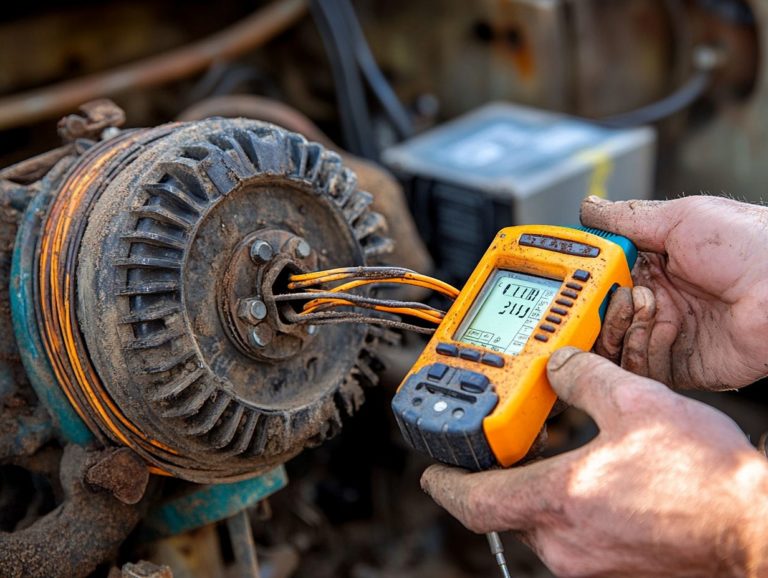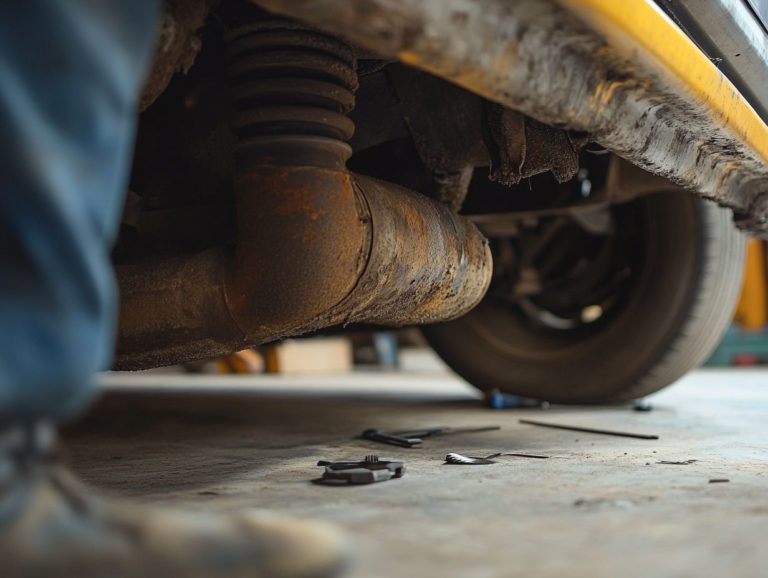What Common Issues Cause Car Vibrations?
Are you feeling unexpected vibrations while driving? This could indicate a problem with your vehicle. Let’s explore the common causes and find solutions to restore your smooth ride!
Experiencing vibrations while driving can be quite unsettling and may signal underlying issues with your vehicle. From tires and wheels to suspension and engine components, several factors contribute to this troubling phenomenon. Understanding the root causes of car vibrations is crucial for maintaining your vehicle’s performance and safety.
This article delves into the common culprits behind these vibrations, offers insights on how to identify them, and provides practical solutions to help you restore that smooth ride you desire.
Contents
- Key Takeaways:
- Understanding Car Vibrations
- Issues with Tires and Wheels
- Spark Plugs and Motor Mounts
- Transmission Issues and Fluid Levels
- Addressing Car Vibrations
- Diagnosing and Fixing the Problem
- Frequently Asked Questions
- What Common Issues Cause Car Vibrations?
- What is the most common cause of car vibrations?
- Can bad alignment cause car vibrations?
- What parts of a car can cause vibrations?
- How can I tell if my car’s vibrations are caused by the engine?
- Can a damaged driveshaft cause car vibrations?
- What should I do if my car is vibrating?
Key Takeaways:
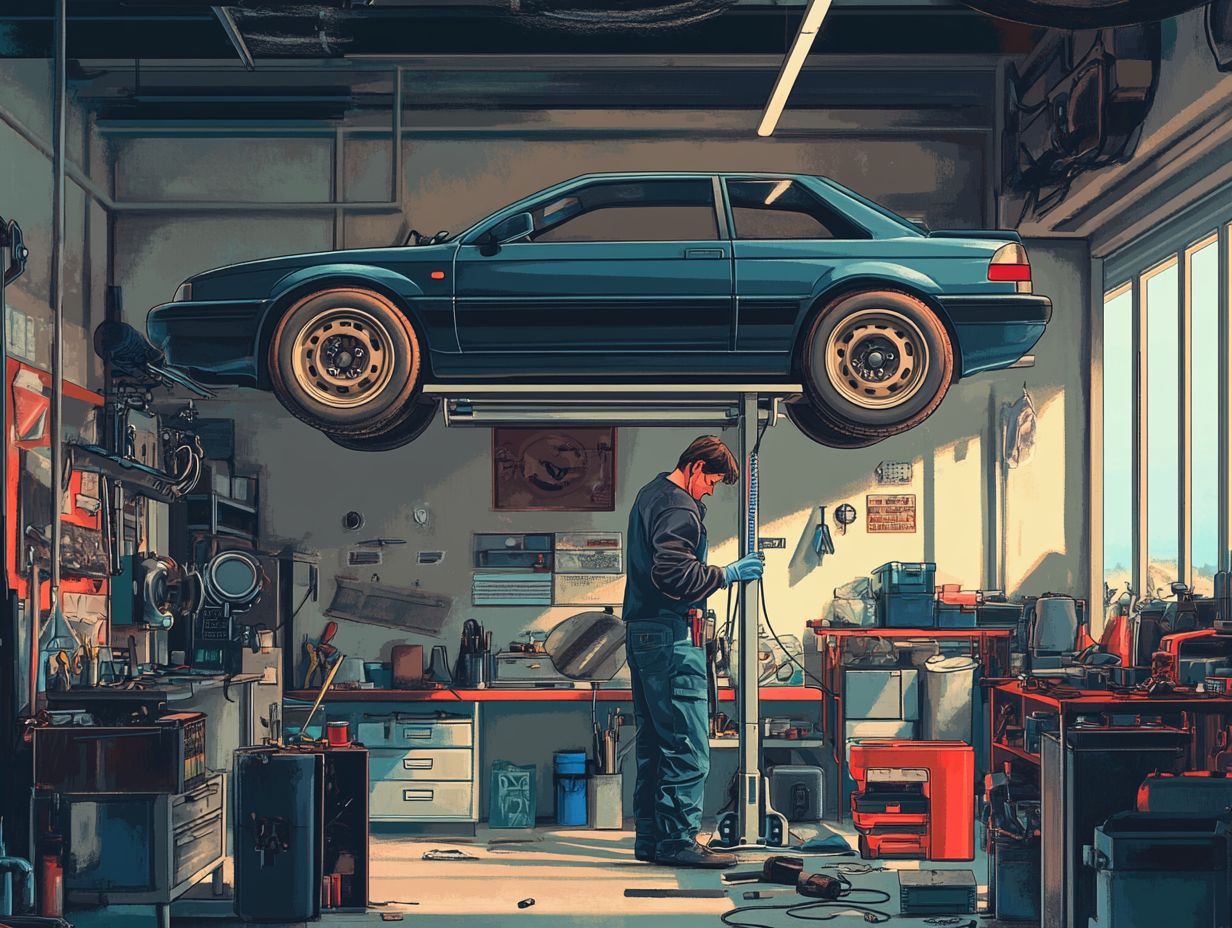
- Uneven tire wear and alignment problems can cause car vibrations and should be checked regularly.
- Worn shocks and struts, as well as issues with tie rods and ball joints, are common suspension and steering problems that can lead to car vibrations.
- Engine and transmission issues, such as spark plugs, motor mounts, and low fluid levels, can also contribute to car vibrations and should be addressed promptly.
Understanding Car Vibrations
Understanding car vibrations is essential for maintaining your vehicle’s performance and ensuring your driving comfort. Various factors such as engine problems, transmission mount issues, or even less-than-ideal driving habits can lead to unsettling vibrations, including that uncomfortable shaking that often signals deeper concerns.
Recognizing these vibrations is key. Consulting a mechanic for expert advice is a wise move, as they can arise from a range of causes that necessitate a thorough inspection.
A tailored maintenance schedule is essential. Regular check-ups can help identify the sources of these vibrations early on, ensuring your vehicle’s safety remains uncompromised.
Key Reasons Your Car Might Shake
Car vibrations can stem from a variety of underlying issues, primarily tied to the engine, tires, and suspension components. You might encounter problems like engine misfires, uneven tire wear, or improper wheel alignment, all of which can lead to that unsettling shaking and unusual noises while driving.
Take a failing spark plug, for instance; it can disrupt the fuel burning process, resulting in irregular engine performance and those annoying vibrations. Fuel filter blockages can also restrict fuel flow, contributing to similar engine irregularities.
Regarding tires, vibrations often arise from uneven tread wear caused by misalignment or imbalanced tires, making your vehicle shake especially at higher speeds.
Worn suspension parts, like struts or shocks, can fail to absorb road imperfections effectively, leading to additional disturbances felt throughout the car. Addressing these specific issues not only enhances your driving comfort but also ensures your safety on the road.
Issues with Tires and Wheels
Tire and wheel issues are among the leading culprits behind unsettling car vibrations, and they can profoundly impact both your driving safety and comfort. Factors like uneven wear, misaligned wheels, and tire balance discrepancies can create those annoying vibrations, often manifesting as a shaking steering wheel.
Don’t wait until those minor vibrations turn into major problems! Addressing these issues promptly can save you time and money down the road. It’s essential to tackle these concerns promptly, utilizing tire rotation and regular maintenance practices to ensure a smooth and safe driving experience.
Uneven Tire Wear and Alignment Problems
Uneven tire wear and alignment issues can create significant vibrations that detract from your driving comfort and safety. Adhering to a regular maintenance schedule that includes tire rotation and proper wheel alignment checks is crucial in preventing these problems from escalating and causing further damage.
Many drivers tend to overlook the impact of misaligned wheels, which can accelerate tire tread deterioration. This results in uneven wear patterns that compromise grip and traction. You might notice excessive wear on one side of your tires, leading to imbalanced handling and increasing the risk of blowouts.
To mitigate these risks, it s essential to follow a comprehensive maintenance protocol that prioritizes timely inspections and adjustments. Without regular attention, your vehicle s performance can suffer, potentially leading to costly repairs and compromised safety on the road. This highlights the importance of being proactive rather than reactive when it comes to vehicle upkeep.
Wheel Balancing and Bent Rims
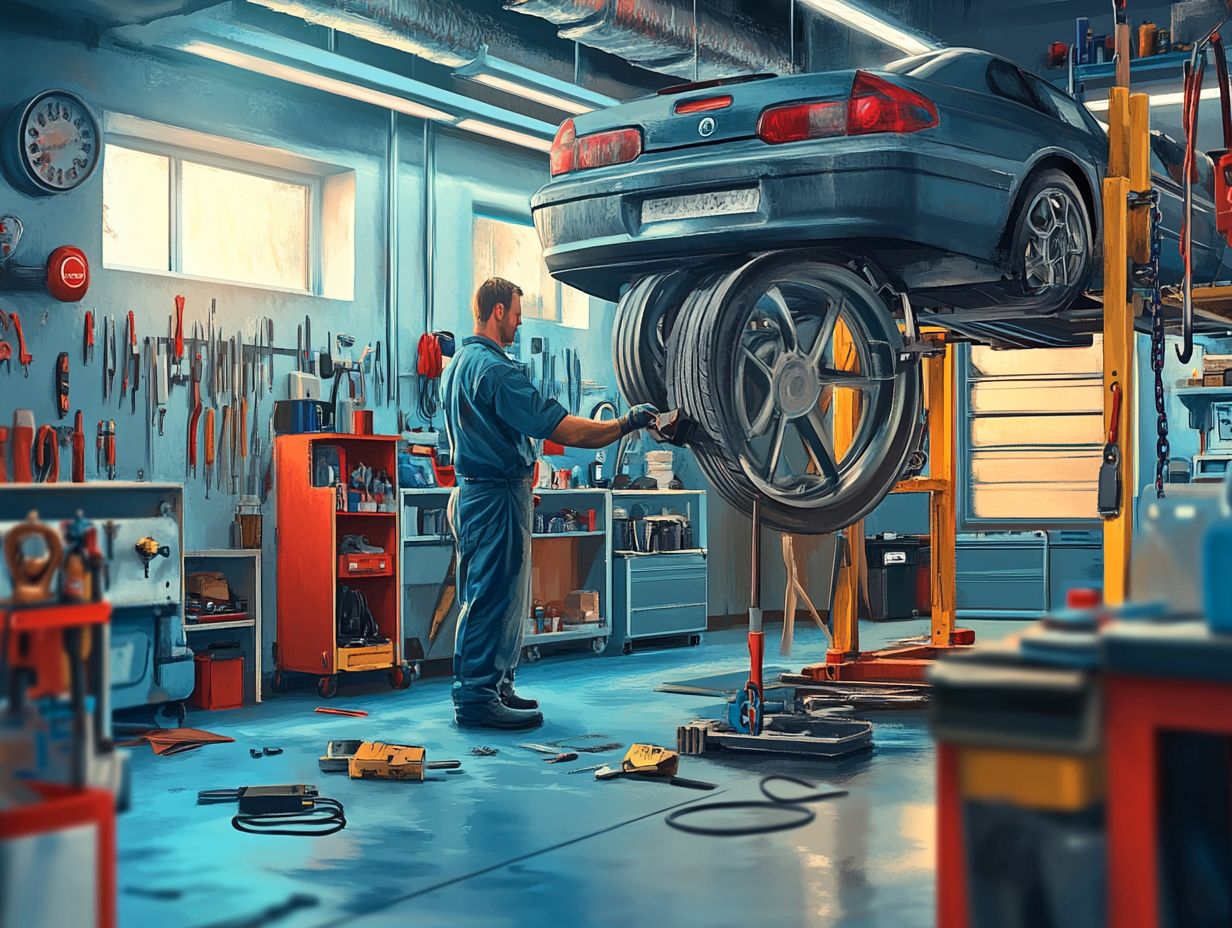
Wheel balancing and bent rims are important factors that can cause car vibrations. Addressing them quickly can help prevent further damage.
Proper tire balance means achieving even weight distribution. Bent wheels might require a professional mechanic’s expertise to see if they can be repaired or need replacement.
If you notice symptoms like uneven tire wear, a shaking steering wheel, or a drumming noise while driving, it often means you have unbalanced wheels or damaged rims. Ignoring these signs can lead to serious problems, like compromised handling and a higher risk of tire blowouts.
Prolonged neglect may even affect your vehicle’s suspension system, resulting in costly repairs later.
For this reason, seek the guidance of a knowledgeable mechanic who can provide effective solutions, ensuring both the safety and longevity of your vehicle.
Problems with Suspension and Steering
Issues with suspension and steering systems can create vibrations that make your car harder to control and less safe. Worn components, like shock absorbers (parts that help smooth out bumps) and tie rods (which help steer your car), can cause steering wheel shake and other vibrations.
Don t wait! See a mechanic right away to solve these issues and ensure timely repairs and maintenance.
Worn Shocks and Struts
Worn shocks and struts are common problems that can affect your vehicle’s stability and contribute to annoying vibrations while driving. These suspension parts are crucial for absorbing road shocks and maintaining control.
When they wear out, you may notice uneven handling and increased vibrations. It’s important to stay proactive with your vehicle maintenance.
As these parts age, you might experience a decline in ride comfort. Symptoms may include excessive bouncing, steering difficulties, or a sense of instability during sharp turns. Be aware of common signs that signal the need for replacement:
- Leaks
- A noticeable dip in your vehicle’s stance
- Unusual tire wear patterns
Regular inspections and maintenance can help you catch these issues early. This approach not only ensures your safety but also enhances your overall driving experience.
Issues with Tie Rods and Ball Joints
Problems with tie rods and ball joints can lead to serious steering issues and vibrations in your vehicle. These parts are vital to the steering system; any wear or damage can result in poor handling and an uncomfortable ride.
As these components wear, symptoms may include uneven tire wear, a loose steering wheel, or difficulty keeping your car straight. Never ignore these symptoms they could lead to serious problems!
This vulnerability compromises your vehicle’s stability and impacts safety on the road.
By monitoring and addressing the condition of tie rods and ball joints, you can enhance your vehicle s handling and longevity, ensuring a smoother and safer ride for yourself and others.
Engine and Transmission Troubles
Engine and transmission issues can greatly contribute to unwanted car vibrations. Often, these problems arise from factors like engine misfires, faulty spark plugs, or a damaged transmission mount.
Identifying the root causes of these vibrations is crucial for maintaining your vehicle’s performance and ensuring a smooth, enjoyable driving experience.
Spark Plugs and Motor Mounts
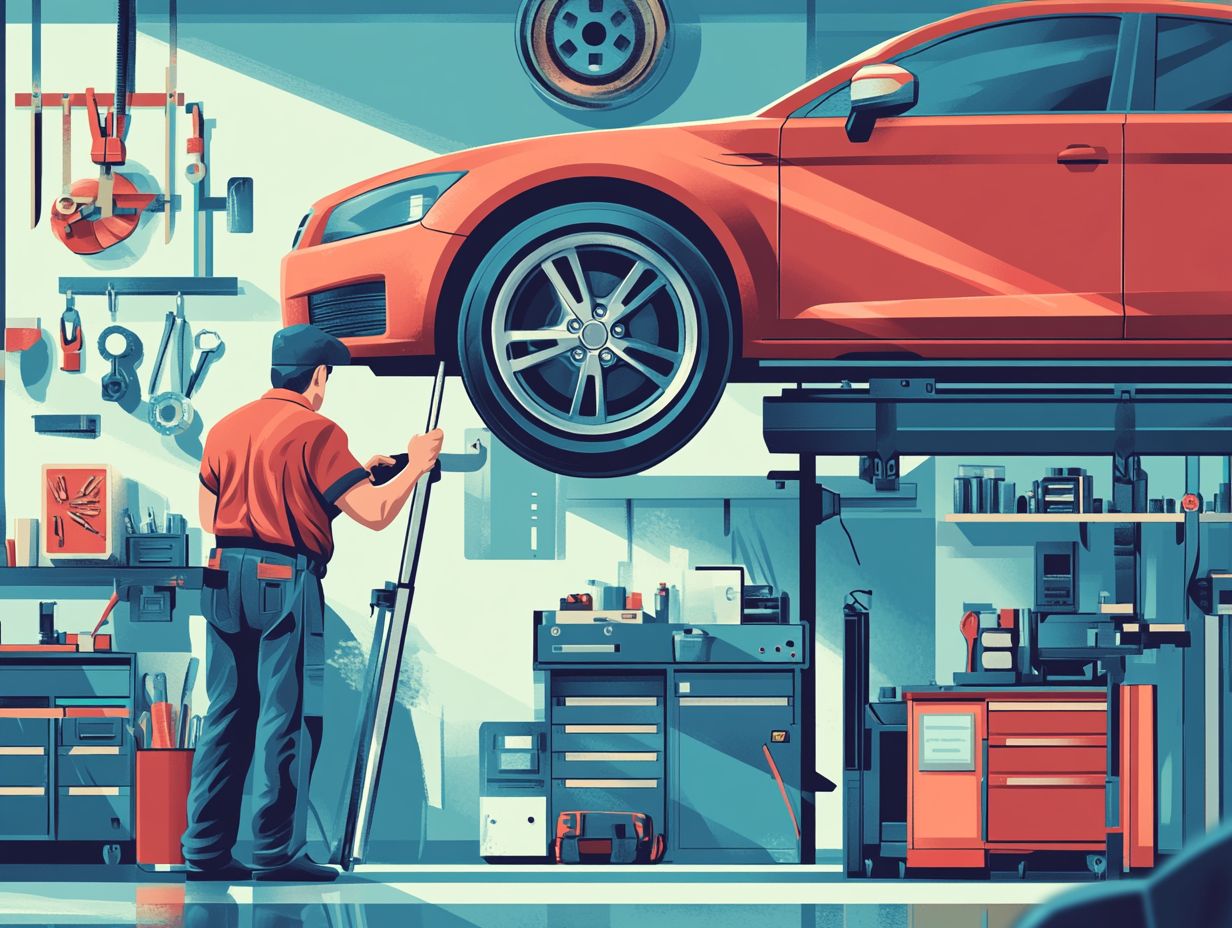
Spark plugs and motor mounts play a critical role in your engine s performance. Any issues with these components can lead to noticeable vibrations.
If your spark plugs are faulty, you might experience engine misfires. Damaged motor mounts can amplify vibrations throughout your vehicle, making regular maintenance essential.
The performance of your spark plugs directly affects how efficiently your engine runs, influencing fuel consumption and overall power output. Worn plugs can disrupt the combustion process, leading to wasted fuel and reduced performance.
Motor mounts are vital for absorbing engine vibrations and ensuring a smooth driving experience. If these mounts fail, vibrations can travel through the chassis, causing discomfort for passengers and leading to further wear on other components.
Regular inspections of both spark plugs and motor mounts are crucial. Catching issues early can prevent more significant problems and enhance your vehicle’s longevity.
Transmission Issues and Fluid Levels
Transmission issues and low fluid levels can cause unsettling vibrations in your vehicle. This significantly impacts its performance and drivability.
You should regularly check fluid levels and look for vibrations to address potential engine issues before they escalate. These vibrations often serve as warning signs of underlying transmission troubles.
Worn components or insufficient fluid lubrication can lead to these issues. Maintaining proper transmission fluid levels is crucial for smooth operation, preventing overheating and premature wear.
Routine inspections help catch problems early. This allows you to intervene in a timely manner and potentially save on costly repairs.
By monitoring fluid conditions and assessing vibration patterns, you can ensure a stable driving experience and extend the lifespan of your transmission system.
Addressing Car Vibrations
Effectively addressing car vibrations requires a systematic approach. You should conduct thorough vibration analyses and routine inspections to identify the underlying causes.
Consulting with a qualified mechanic is essential for maintaining optimal driving comfort and performance. This proactive strategy will help you enjoy a smoother ride and prolong your car’s life.
Diagnosing and Fixing the Problem
Diagnosing and fixing car vibrations involves assessing multiple vehicle components. This is guided by expert mechanic advice and advanced vibration analysis techniques.
Adhering to a regular maintenance schedule allows you to catch issues early, ensuring timely repairs and optimal performance. Mechanics conduct visual inspections of vital parts like tires, brakes, and suspension systems, searching for signs of wear or damage.
They also examine wheel alignment and balance, which are essential for a smooth ride. By investigating these components, they can pinpoint the root cause of the vibrations.
Addressing concerns promptly is crucial. Without timely intervention, minor issues can escalate into expensive repairs and possible safety hazards.
Regular maintenance extends your vehicle’s lifespan and provides peace of mind, minimizing the risk of recurring problems.
Frequently Asked Questions
What Common Issues Cause Car Vibrations?
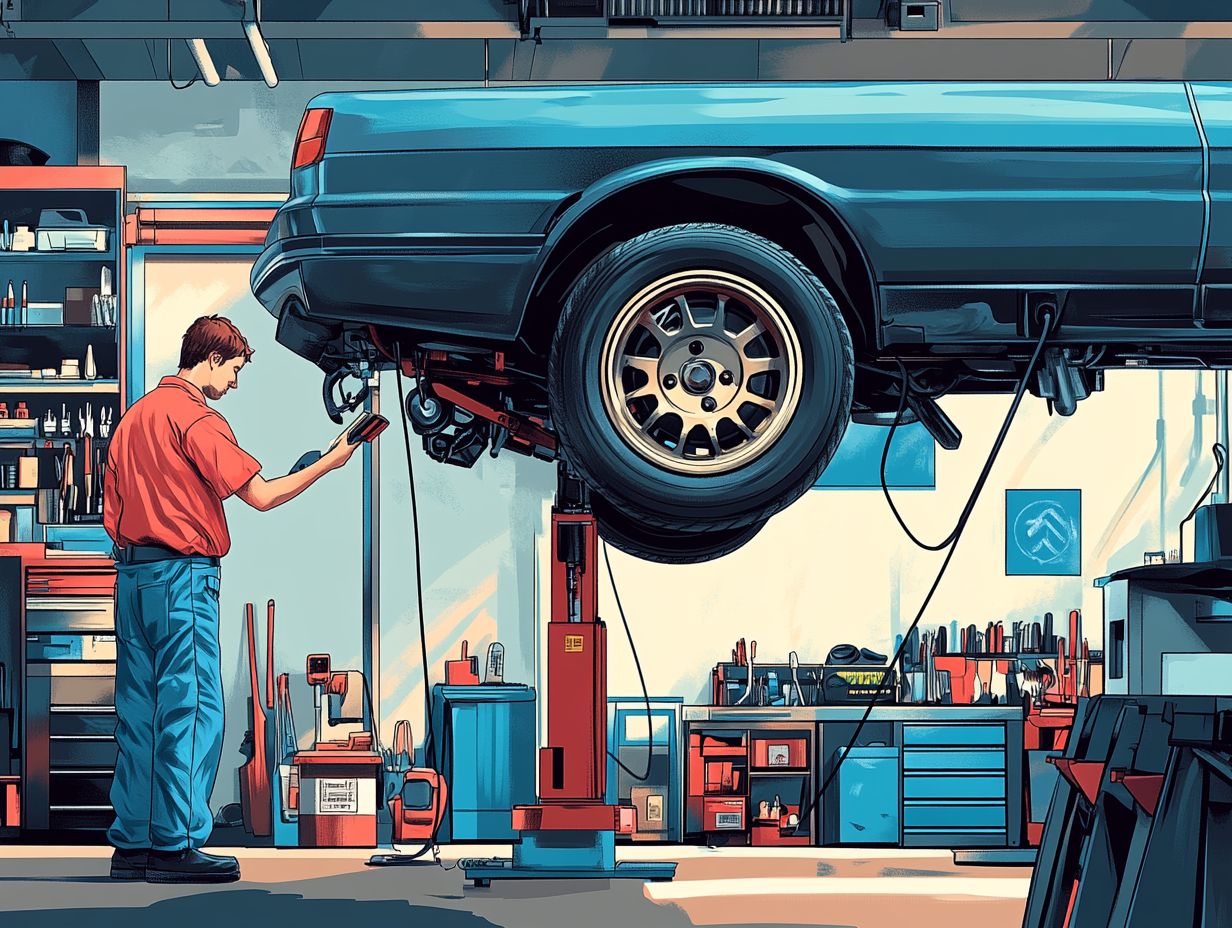
Car vibrations can stem from various issues, including:
What is the most common cause of car vibrations?
The most common cause of car vibrations is an unbalanced or damaged tire due to uneven tire wear or a puncture.
Can bad alignment cause car vibrations?
Yes, bad alignment can lead to car vibrations. Misaligned wheels cause uneven tire wear, resulting in vibrations while driving.
Don’t wait! Regular maintenance can save you from bigger problems later. For more information or to schedule an inspection, please reach out!
What parts of a car can cause vibrations?
Besides tires, several parts can cause vibrations in your car. These include the suspension system, brakes, and engine components.
How can I tell if my car’s vibrations are caused by the engine?
If you feel vibrations when the car is stationary, the engine is likely the culprit. This might happen due to worn engine mounts or a misfiring engine.
Can a damaged driveshaft cause car vibrations?
Yes, a damaged driveshaft can lead to vibrations. This often results from worn joints that connect sections of the driveshaft or a bent driveshaft.
What should I do if my car is vibrating?
Don t ignore vibrations! Get your car checked by a mechanic right away to ensure it runs smoothly and safely.

